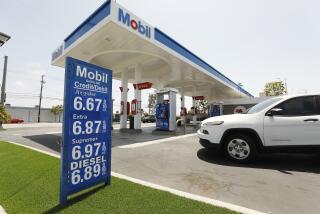France, Spain Propose Steps for Saving Fuel : Economics: Anticipating an oil shortage, they want to avoid repeating the traumas of the 1970s.
- Share via
PARIS — Anticipating a shortage of crude oil in Europe because of the international embargo on trade with Iraq and Kuwait, leaders in France and Spain have proposed fuel-conservation measures ranging from lower highway speed limits to higher fuel taxes.
Other European countries are expected to follow suit after the European Community’s energy ministers meet next week in Brussels.
The measures proposed Monday by Prime Ministers Michel Rocard of France and Felipe Gonzalez of Spain are aimed at avoiding the kind of energy crisis that hit Europe with the first so-called oil shock of 1973 and, to a lesser extent, the second in 1979.
The proposals followed a series of fuel-tax increases last month in Greece, which before Iraq’s Aug. 2 invasion of Kuwait imported more than 30% of its crude oil from the two Persian Gulf countries.
European countries are much more dependent on oil from the Persian Gulf region than is the United States, which gets only about 7% of its imported oil from there. In contrast, the 17 European members of the International Energy Agency obtain 24% of their crude oil from the gulf states. According to the agency, European countries last year imported about 200 million barrels of oil from the gulf region.
By taking early steps, the governments of France and Spain clearly hope to spark a unified European response and strengthen the Continent’s position in the face of potential oil shortages. In the past, similar all-Europe proposals have been opposed by one or more of the 12 nations in the European Community.
In West Germany, for example, where the no-speed-limit autobahns are a source of national pride, the idea of reducing highway speeds as a means of conserving energy has been opposed consistently.
In his outline of conservation proposals, Rocard suggested that speed limits be reduced from 78 m.p.h. to 66 on major French highways and from 36 m.p.h. to 30 in towns and cities. He said these changes would reduce French fuel demands by about 16 million barrels of crude oil a year.
Along with the lower speed limits, the French government is expected to reduce the sales tax on automobiles to help stimulate car sales, which normally decline when fuel-conservation measures are introduced. The energy conservation package is expected to be proposed formally Sept. 12.
“It is necessary that France adapt to the situation as it develops,” said a spokesman for President Francois Mitterrand. “The first principle is to economize on energy.”
In Madrid, Gonzalez previewed his government’s policy in a weekend television address, outlining a series of fuel-tax increases and government spending cuts.
In announcing “an effective policy of moderation of revenues, salaries and prices,” Gonzalez vowed to prevent a repeat of the oil shocks of the 1970s.
“This time. we are going to take timely measures,” he said.
The French and Spanish proposals were made despite a relatively optimistic report last week by Dr. Ulrich Engelmann, chairman of the governing board of the 21-nation International Energy Agency, which was formed in 1974.
“For the present,” Engelmann said in a statement, “the market is generally well supplied. Given the oil market outlook for the next two months, governments do not consider additional measures to be necessary right now.”
GASOLINE PRICES IN WESTERN EUROPE
Prices are in U.S. dollars. Country/Price per gallon
Belgium: $3.80 Britain: 3.56 Denmark: 4.46 France: 4.37 Greece: 3.23 Italy: 4.92 Netherlands: 4.21 Norway: 4.10 Portugal: 3.76 Spain: 3.14 Sweden: 4.85 Switzerland: 3.87 West Germany: 3.05
Source: Associated Press
More to Read
Sign up for Essential California
The most important California stories and recommendations in your inbox every morning.
You may occasionally receive promotional content from the Los Angeles Times.













